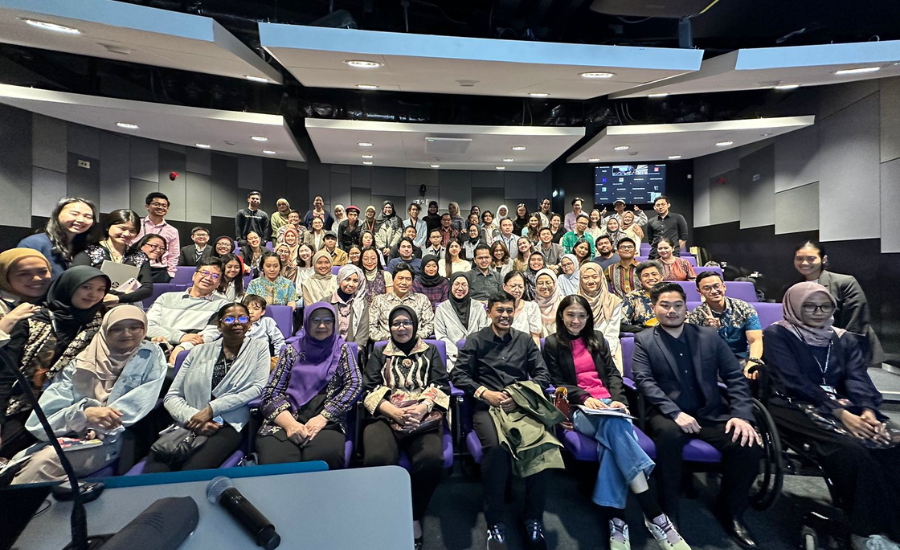Dyslexia & DrPH: Sarah's journey getting diagnosed & supported
5 September 2024 London School of Hygiene & Tropical Medicine London School of Hygiene & Tropical Medicine https://lshtm.ac.uk/themes/custom/lshtm/images/lshtm-logo-black.png
Sarah (second from the left) strolling among the Lavender at Hitchin with some of her Indonesian friends from UCL
Hey everyone! I'm Sarah, a first-year Doctorate of Public Health (DrPH) student currently navigating the exciting (and sometimes overwhelming) world of public health research at the London School of Hygiene & Tropical Medicine (LSHTM). Although seven years have passed, it feels like just yesterday I was finishing up my Master's in Public Health. But here I am, diving back into the academic grind after working in the realm of public/global health diplomacy. I'm excited to share my experiences and hopefully help others on their own public health journeys.
Transition to DrPH
The transition from the relative calm of my MPH and the relatively structured life of my professional endeavour to the intense focus of a doctoral study has been challenging, to say the least. After the initial rush of mandatory courses during my first term at the School, I hit a wall. The loneliness crept in, and I realized I needed more than just support from family and friends and social outings to cope. The complex readings felt like impenetrable walls, the feeling of not having control of my study started to build up and the pressure to succeed was starting to take a toll. I was feeling overwhelmed and isolated, struggling to keep up with the doctoral study's workload. I craved someone to talk to who understood the academic challenges I was facing, someone who could offer guidance and help me develop a plan to move forward. That's when I decided to reach out to the Student Support Services.
Student Support Services & my diagnosis
Their assistance from the student support service has been invaluable. The process of getting the appointment with the student support officer was straight forward, and I did not need to wait a long time to finally be able to get in touch with my mental health counsellor. The counselling and mental health support counsellor provided a safe space to openly discuss my struggles with kindness and without judgment. Even the voice of my counsellor was really soothing. Together, we've met several times and explored strategies to manage my mental health and navigate the academic challenges. After a few sessions, she suggested and convinced me to do the assessment for dyslexia, which after a series of assessments facilitated by the School, I found that I am, indeed, dyslexic.
The dyslexia consultant, recommended by the School, has been instrumental in understanding my learning style and developing effective study techniques (although for full disclaimer, it’s still a work in progress). Their support has empowered me to better manage my dyslexia and excel academically. The assessment and subsequent counselling were pivotal in helping me navigate the complexities of my academic journey. By pinpointing the root causes of my struggles, I gained clarity on the challenges I faced. The tailored strategies and coping mechanisms provided by the counsellor were instrumental in developing a robust approach to managing my workload and stress levels. This newfound steadiness enabled me to approach my studies with renewed focus and efficiency and will ultimately enhance my research productivity and overall academic performance.
It's okay to ask for help
I cannot overstate the importance of seeking support when faced with academic challenges, no matter how small or benign your challenges may seem at first. It is easy to dismiss the challenges and brush them off. But I learned that there is no shame in seeking additional support. Remember, seeking help is a sign of strength, not weakness. Don't hesitate to reach out to the LSHTM Student Support Services. Early intervention can make a huge difference. Take advantage of the support services available to you, and don't be afraid to advocate for your needs. By sharing my experiences, I hope to encourage others to seek support when needed.
It's okay to ask for help; it's a sign of resilience, not weakness.
- Contact Sarah via our contact student ambassador page.
- Read 5 steps to get yourself settled in London as an international student.
- Learn more about the Student Support Services at LSHTM.
- You may be interested in: Defying deeply rooted traditions & studying all the way to DrPH: Ahsana's journey
- Discover DrPH.

